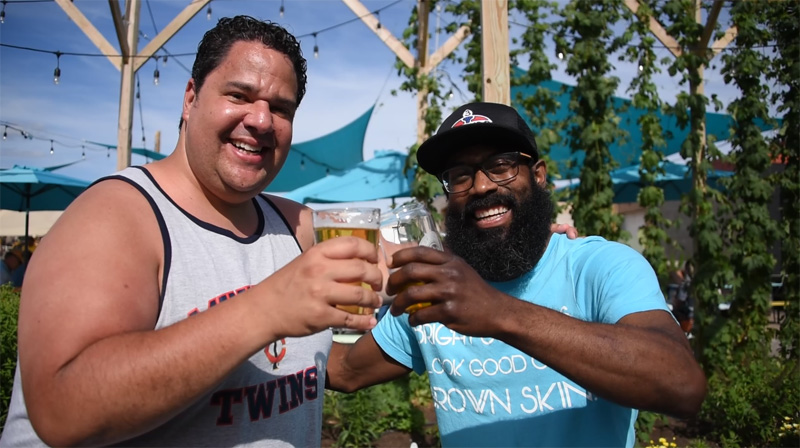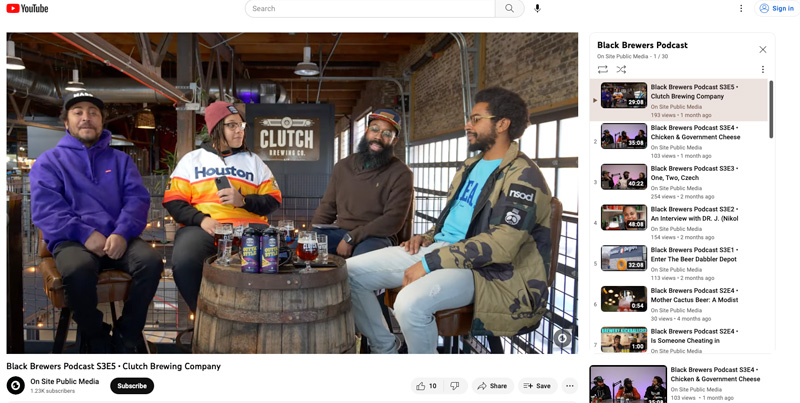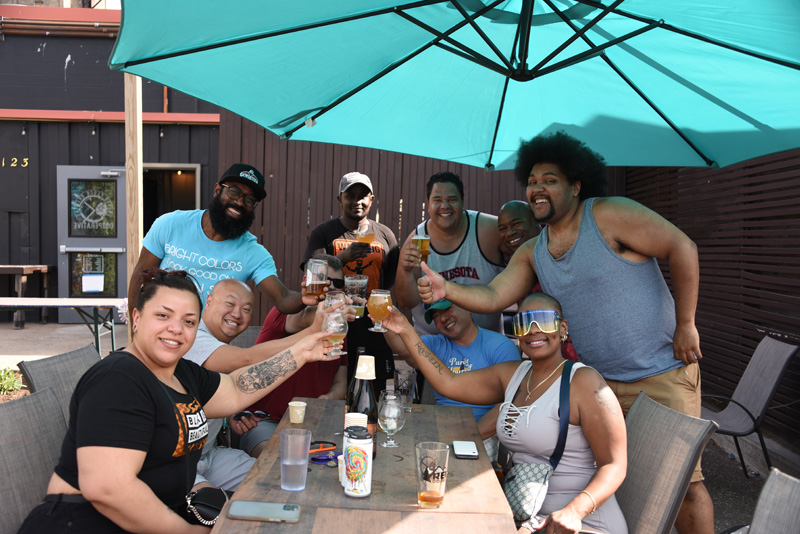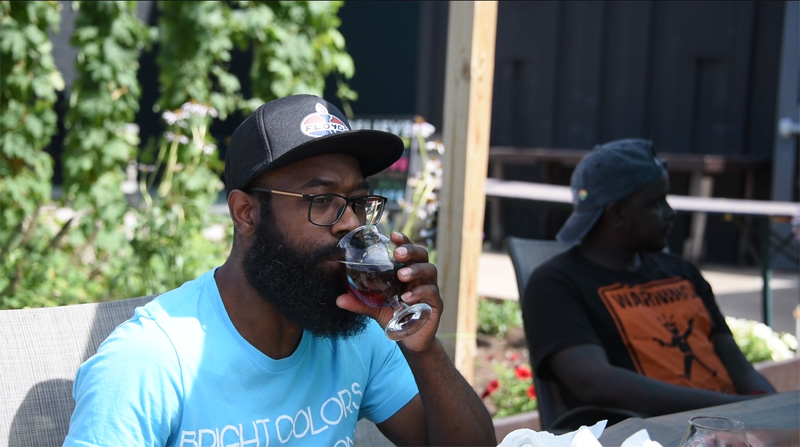Anthony Jennings currently works at Arbeiter Brewing Company in Minneapolis and has also worked at Inbound, One Fermentary, and Pryes. An industry vet, he’s also making noise as part of the Black Brewers Podcast along with Greg Davenport and Phillip Owens.
I’ve known Jennings for a while now, and though we’ve been wanting to sit down and chat about his career in beer, life kept getting in the way. This month we were finally able to connect. Plus, BBP was recently awarded a grant from the Brewers Association, making this the perfect time to check them out and see what they’re up to.
LOUIS LIVINGSTON-GARCIA: How did you end up at Arbeiter?
ANTHONY JENNINGS: There’s something to be said about starting work at a brewery from the ground up. You know, Pryes already has a reputation in my head and looking for the future I was like, ‘I may only go so far at Pryes.’ And I love that vision of Arbeiter as a community focused brewery, as opposed to just more of a corporate type. I felt that my voice will be heard more at Arbeiter.
The message I wanted to get across being a BCC (Brewing Change Collab) member with having an owner who is Korean American who understands some of the hurdles and things that we go through as BIPOC people in the industry would be better received. At the end of last year, I started training in the back of the house and you know, just kind of went from there and they also allowed me to do my side ventures, you know, I told him I’m gonna do this podcast. I told him eventually I want to start my own (draft) line cleaning business. They allow me to grow within Arbeiter and to grow outside of Arbeiter, which is very important to me.
LLG: Tell me more about your beer line-cleaning business venture.
AJ: I got taught how to line clean by [Arbeiter brewer] Aaron Herman, and myself and another co-worker of mine, we clean our lines every two weeks. So there was an opportunity at BCC to take these entrepreneurship classes. I took those classes last summer. My goal this year outside of the podcast is to get that up by the end of the year.
I’m doing it because there isn’t a person – I looked this up – there is no line cleaning business run by a person of color in America.
There are people of color who want to be in the business but who don’t want to be a bartender may not want to be a seller may not want to be a buyer. This is another avenue and you can control what you do, how you do, and who you work with. I’m a big fan of empowering us to find their place in this industry that’s not traditional.

I’m doing it because there isn’t a person – I looked this up – there is no line cleaning business run by a person of color in America. So another goal of mine like Better Beer Society, they will have independent contractors that work for them. You set your own schedule. My goal is to do the same thing but across America. Again, there are people of color who want to be in the business but who don’t want to be a bartender may not want to be a seller may not want to be a buyer. This is another avenue and you can control what you do, how you do, and who you work with. I’m a big fan of empowering us to find their place in this industry that’s not traditional.
LLG: How has the podcast been going for you?
AJ: We applied for a media badge to the Winter Beer Dabbler [in 2022], like you know, let’s just see what happens. We were accepted. We’re like, ‘oh, shit, this is real.’ So our first Winter Dabbler last year was our first time doing interviews, meeting people, our first fest, and we had a great time there. We interviewed Arbeiter, we interviewed other people, and people started to be like, ‘OK, who are these guys?’ I mean, we know them from the industry but what is this podcast?

So it just kind of snowballed from there. We tried to do as many brewery episodes as possible that first year. We just threw things to the wall. And as the show kept going, our chemistry kept going. You know? And we did. I think we developed a good chemistry. We were friends before, now I call them my brothers because we spend so much time together talking about life and it just grew into this thing.
LLG: We’ve talked about how weird it can be as a BIPOC person walking into a taproom. Has that changed over the years?
AJ: Yes, in a sense. There’s a lot more opportunity for people to see us going into breweries, especially Minneapolis, St. Paul. Once you start getting out of the area, it gets a little tricky. One of my favorite breweries, I love their beer, is Wooden Hill in Edina. Great beer, love their beer. But I remember my first time going to their taproom. The place stopped, I’m the only black guy, walked in, and everybody kind of turned around and looked, like ‘oh, do you belong here?’
I’m at a place within myself I can go into any room and feel comfortable and don’t care if that happens at this point. Whereas before I was in the industry, I would have probably walked out. So – yes, in the Cities you see more of us. A lot of us work in the industry, you know, especially with BCC, we have interactions, we are a known entity, and that helps, but out state is still weird.
LLG: With the podcast getting so much recognition and you being such a big part of the industry, do you see yourself as a leader?
AJ: I actually do see myself as a leader, a year and a half ago I would not have said that. I say it now because I’ve seen the work that we’ve done, and the people who tell us, you know, man, thank you. And it’s funny to hear that from people… your peers in the industry like that, that we need these voices. That really means a lot to me, because that means that people outside of us are taking notice of what we’re doing and are trying to be equitable. And want to learn how to diversify their taproom, want to learn how to how do we, how do we get people of color to apply for a job?

And, you know, Dan Beaubien, you know, he started A One Pint Stand, he told me this last week we inspired him to go on his own to start his own podcast. And you see, that’s very heartwarming to see that we inspire somebody because to me, he was like one of my heroes because he’s been blogging about beer for a while. And when we go to festivals, you know, seeing people from CBC (Craft Brewers Conference) and people telling us, ‘hey man you inspired us.’ That makes us feel good.
I’m in talks about being on the Brewers Guild of Minnesota on the DEI board, I’m in talks to see what that looks like. So it’s not that I’m going to just jump in, but what is it like, what is the commitment, and do I have the time. But I’m interested to talk about it and see what I can help bring to the guild here. So I’ve definitely considered myself a leader. I definitely want to empower other people like us to do things in this community.

